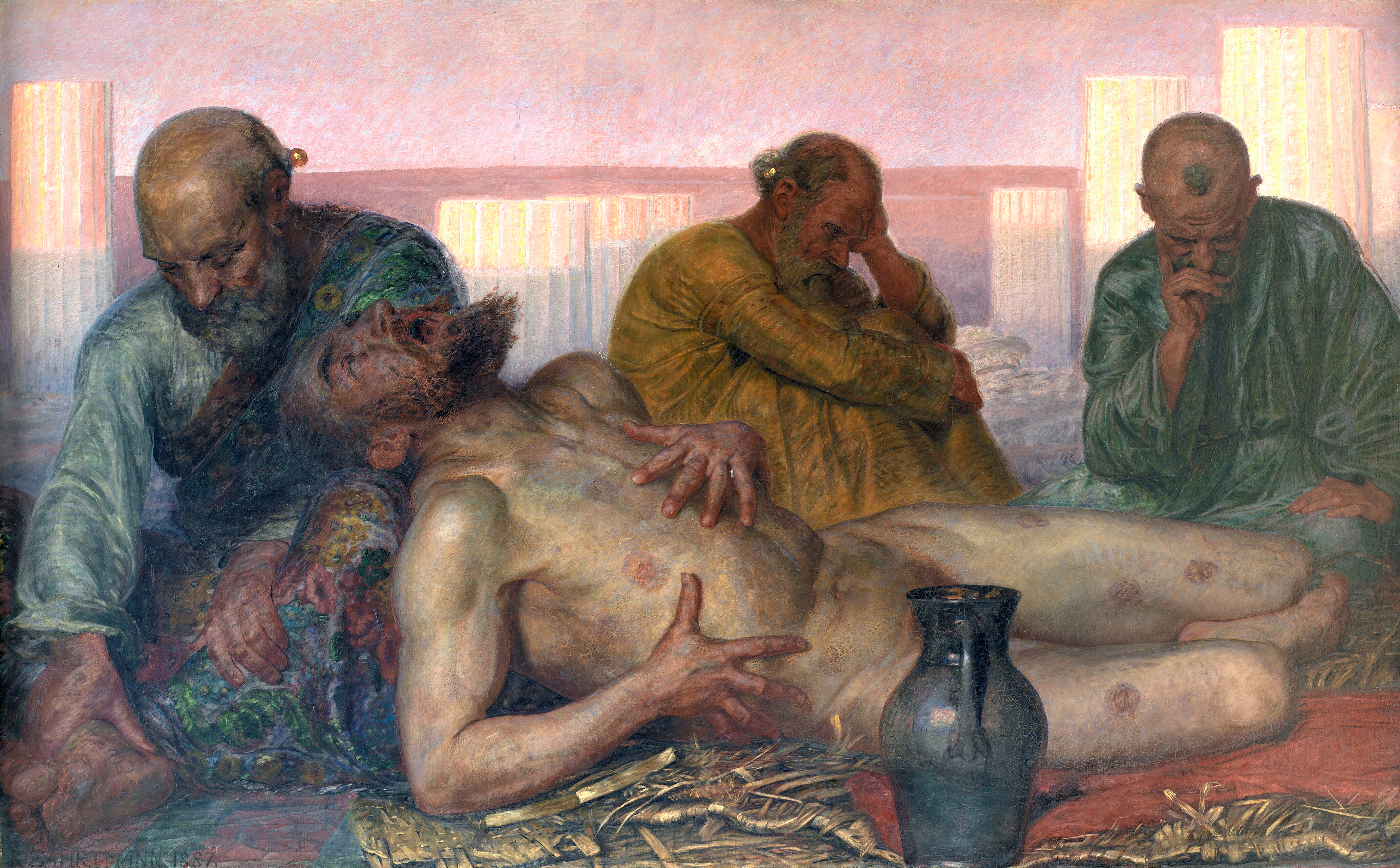Jesus insists that the little children can come to Him. He is available to them just as much as He is to the adults, much to the shock of the adults surrounding Him. Jesus then asks those shocked adults to consider how these children have qualities the adults are lacking. “Whoever does not accept the Kingdom of God like a child will not enter it.” As I pondered the qualities a child has, the Holy Spirit drew my attention to an aspirational prayer in a Mass journal I have.
Breathe in: Give me ears that listen
Breathe out: and a heart that loves
I found myself considering how these two motions, listening and loving, are foundational to the childhood experience and are both crucial to accept the Kingdom of God.
First, we have to listen. As children, our first experience of the world is sound. Even before we are born, babies can hear the sounds of the world outside of their mother. A young baby, days old, can barely see a few feet beyond themselves, but their hearing is perfect. They soak in sounds, language. We learn to speak first by hearing it. “At birth, the infant brain can perceive the full set of 800 or so sounds, called phonemes, that can be strung together to form all the words in every language of the world” (Patricia K. Kuhl, How Babies Learn Language, 2015). This is incredible! We have such a huge capacity for language, both to listen to and speak, as small children that fades as we grow more set in our ways as adults.
Simultaneously, babies are learning about what it means to be loved, to be cared for. They are completely reliant on their parents to love them. To love someone, to will the good of the other, is foundational for a child. As the child grows, they come to consciously perceive this and begin to freely offer that love back to their family. At lunch a few days ago, my three year old looked up and said, “Mommy, I love you. The next day, I will love you still.” It was spontaneous and spoken from his heart.
Jesus wants to speak to us. He does so in the language we understand with our ears through the people He has placed in our lives. He also speaks to our hearts, in the language of love. These two practices, listening and loving, are beautiful lessons we can strive to grow in while we seek to become more childlike in the eyes of God.
Jesús insiste en que los niños pequeños pueden acercarse a Él. Está disponible para ellos tanto como lo está para los adultos, lo cual es gran sorpresa para los adultos que lo rodean. Jesús luego les pide a esos adultos sorprendidos que consideren cómo estos niños tienen cualidades de las que carecen los adultos. “Les aseguro que el que no reciba el Reino de Dios como un niño, no entrará en él”. Mientras reflexionaba sobre las cualidades que tiene un niño, el Espíritu Santo me llamó la atención sobre una oración aspiracional en un diario de misa que tengo.
Inhalar: dame oídos que escuchen
Exhalar: y un corazón que ame
Me encontré considerando cómo estos dos movimientos, escuchar y amar, son fundamentales para la experiencia de la infancia y ambos son cruciales para aceptar el Reino de Dios.
Primero, tenemos que escuchar. Cuando somos niños, nuestra primera experiencia del mundo es el sonido. Incluso antes de nacer, los bebés pueden escuchar los sonidos del mundo fuera de su madre. Un bebé pequeño, de días de vida, apenas puede ver unos pocos pies más allá de sí mismo, pero su audición es perfecta. Absorben sonidos y lenguaje. Aprendemos a hablar primero al escucharlo. “Al nacer, el cerebro del bebé puede percibir el conjunto completo de unos 800 sonidos, llamados fonemas, que se pueden unir para formar todas las palabras de todos los idiomas del mundo” (Patricia K. Kuhl, How Babies Learn Language, 2015). ¡Es increíble! De pequeños, tenemos una enorme capacidad para el lenguaje, tanto para escuchar como para hablar, que se desvanece a medida que nos vamos afianzando en nuestras costumbres como adultos.
Al mismo tiempo, los bebés están aprendiendo lo que significa ser amado, ser cuidado. Dependen completamente del amor de sus padres. Amar a alguien, desear el bien del otro, es fundamental para un niño. A medida que el niño crece, llega a percibir esto conscientemente y comienza a ofrecer libremente ese amor a su familia. Hace unos días, durante el almuerzo, mi hijo de tres años levantó la vista y me dijo: “Mami, te amo. Al día siguiente, te seguiré amando”. Fue algo espontáneo y lo dijo desde el corazón.
Jesús quiere hablarnos. Lo hace en el lenguaje que entendemos con nuestros oídos a través de las personas que ha puesto en nuestras vidas. También habla a nuestro corazón, en el lenguaje del amor. Estas dos prácticas, escuchar y amar, son hermosas lecciones en las que podemos esforzarnos por crecer mientras buscamos ser más como niños a los ojos de Dios.
 Kate Taliaferro is an Air Force wife and mother. She is blessed to be able to homeschool, bake bread and fold endless piles of laundry. When not planning a school day, writing a blog post or cooking pasta, Kate can be found curled up with a book or working with some kind of fiber craft. Kate blogs at DailyGraces.net.
Kate Taliaferro is an Air Force wife and mother. She is blessed to be able to homeschool, bake bread and fold endless piles of laundry. When not planning a school day, writing a blog post or cooking pasta, Kate can be found curled up with a book or working with some kind of fiber craft. Kate blogs at DailyGraces.net.
Feature Image Credit: Vika Glitter, pexels.com/photo/smiling-baby-lying-on-white-mat-1648377/


 Kathryn Mulderink, MA, is married to Robert, Station Manager for Holy Family Radio. Together they have seven children (including Father Rob), and eleven grandchildren. She is President of the local community of Secular Discalced Carmelites and has published five books and many articles. Over the last 30 years, she has worked as a teacher, headmistress, catechist, Pastoral Associate, and DRE, and as a writer and voice talent for Catholic Radio. Currently, she serves the Church by writing and speaking, and by collaborating with various parishes and to lead others to encounter Christ and engage their faith. Her website is
Kathryn Mulderink, MA, is married to Robert, Station Manager for Holy Family Radio. Together they have seven children (including Father Rob), and eleven grandchildren. She is President of the local community of Secular Discalced Carmelites and has published five books and many articles. Over the last 30 years, she has worked as a teacher, headmistress, catechist, Pastoral Associate, and DRE, and as a writer and voice talent for Catholic Radio. Currently, she serves the Church by writing and speaking, and by collaborating with various parishes and to lead others to encounter Christ and engage their faith. Her website is 
 Emily Jaminet is a Catholic author, speaker, radio personality, wife, and mother of seven children. She earned a bachelor’s degree in mental health and human services from the Franciscan University of Steubenville. She is the co-founder of
Emily Jaminet is a Catholic author, speaker, radio personality, wife, and mother of seven children. She earned a bachelor’s degree in mental health and human services from the Franciscan University of Steubenville. She is the co-founder of 
 David Dashiell is a freelance author and editor in the Nashville, Tennessee area. He has three children, a degree in theology, and enjoys writing about philosophy, theology, culture, music, and comedy. You can find his personal blog, Serious Daydreams, on
David Dashiell is a freelance author and editor in the Nashville, Tennessee area. He has three children, a degree in theology, and enjoys writing about philosophy, theology, culture, music, and comedy. You can find his personal blog, Serious Daydreams, on 


 Deanna G. Bartalini, M.Ed.; M.P.A., is a certified spiritual director, writer, speaker and content creator. The
Deanna G. Bartalini, M.Ed.; M.P.A., is a certified spiritual director, writer, speaker and content creator. The 


 Susan Ciancio has a BA in psychology and a BA in sociology from the University of Notre Dame, with an MA in liberal studies from Indiana University. For the past 19 years, she has worked as a professional editor and writer, editing both fiction and nonfiction books, magazine articles, blogs, educational lessons, professional materials and website content. Thirteen of those years have been in the pro-life sector. Currently Susan freelances and writes weekly for HLI, edits for American Life League, and is the executive editor of Celebrate Life Magazine. She also serves as executive editor for the Culture of Life Studies Program—an educational nonprofit program for K-12 students. You can reach her at
Susan Ciancio has a BA in psychology and a BA in sociology from the University of Notre Dame, with an MA in liberal studies from Indiana University. For the past 19 years, she has worked as a professional editor and writer, editing both fiction and nonfiction books, magazine articles, blogs, educational lessons, professional materials and website content. Thirteen of those years have been in the pro-life sector. Currently Susan freelances and writes weekly for HLI, edits for American Life League, and is the executive editor of Celebrate Life Magazine. She also serves as executive editor for the Culture of Life Studies Program—an educational nonprofit program for K-12 students. You can reach her at 



 Tami Urcia grew up in Western Michigan, a middle child in a large Catholic family. She spent early young adulthood as a missionary in Mexico, studying theology and philosophy, then worked and traveled extensively before finishing her Bachelor’s Degree in Western Kentucky. She loves tackling projects, finding fun ways to keep her little ones occupied, quiet conversation with the hubby and finding unique ways to love. She works full time at Diocesan, is a guest blogger on
Tami Urcia grew up in Western Michigan, a middle child in a large Catholic family. She spent early young adulthood as a missionary in Mexico, studying theology and philosophy, then worked and traveled extensively before finishing her Bachelor’s Degree in Western Kentucky. She loves tackling projects, finding fun ways to keep her little ones occupied, quiet conversation with the hubby and finding unique ways to love. She works full time at Diocesan, is a guest blogger on 
